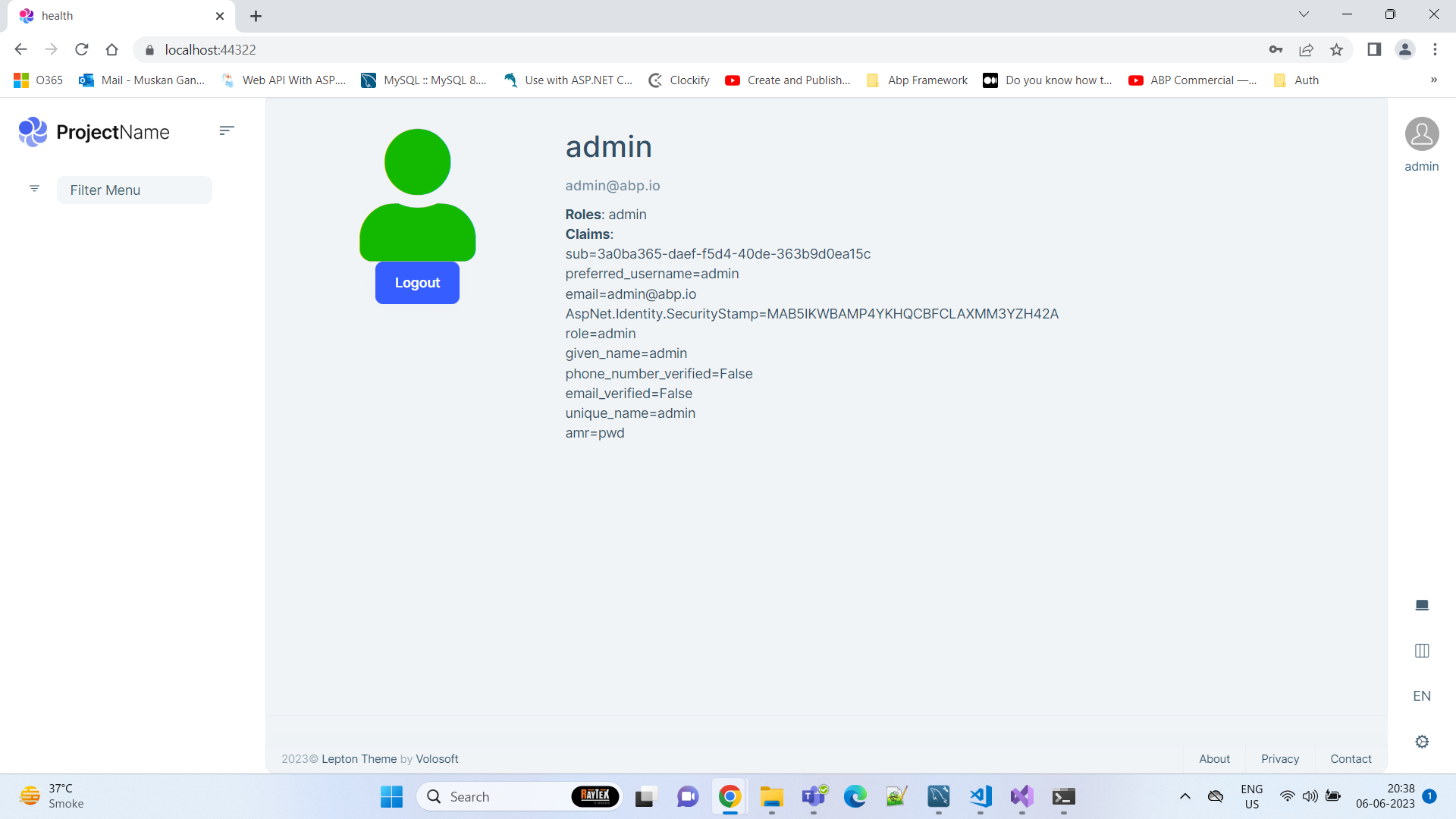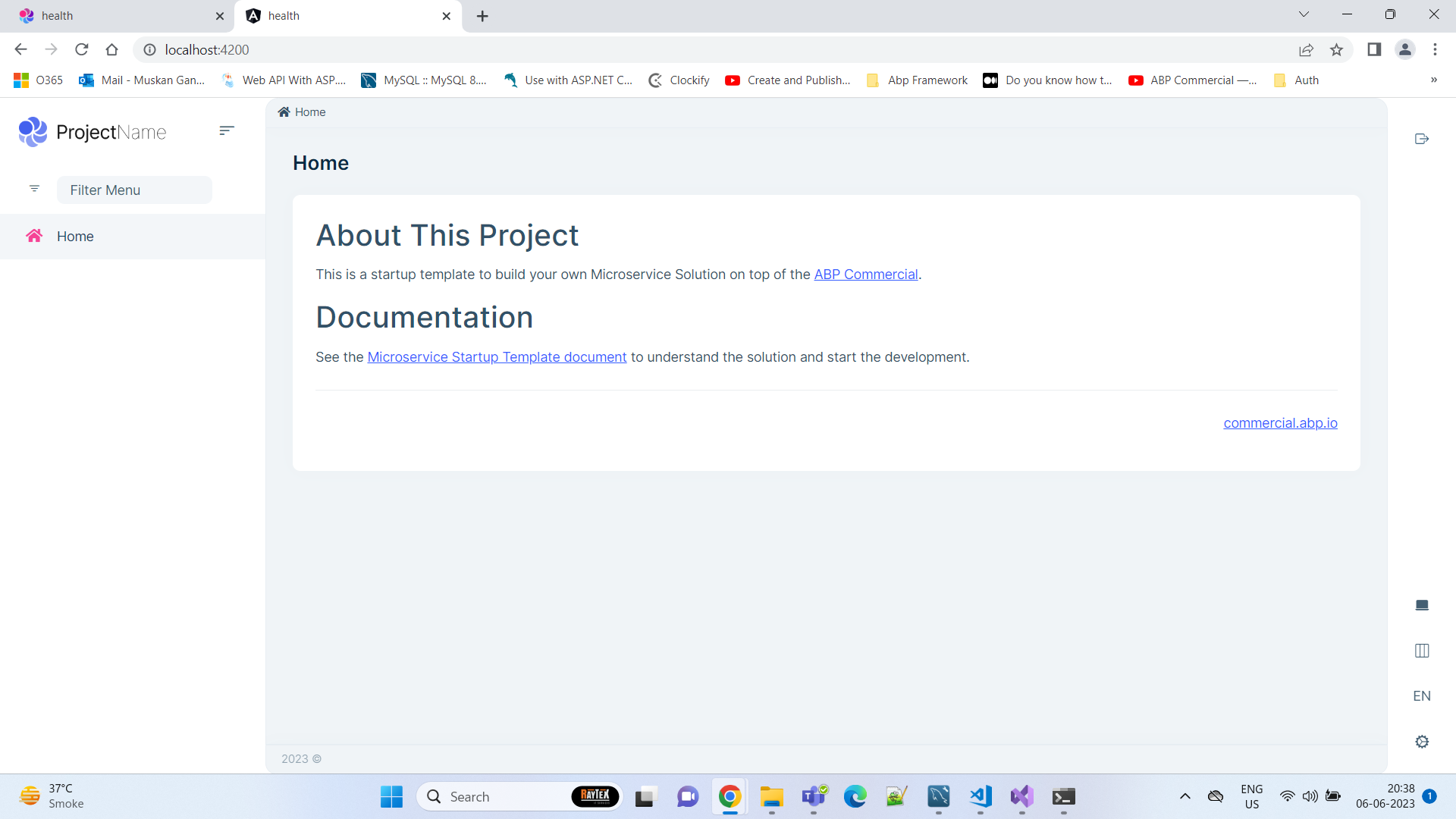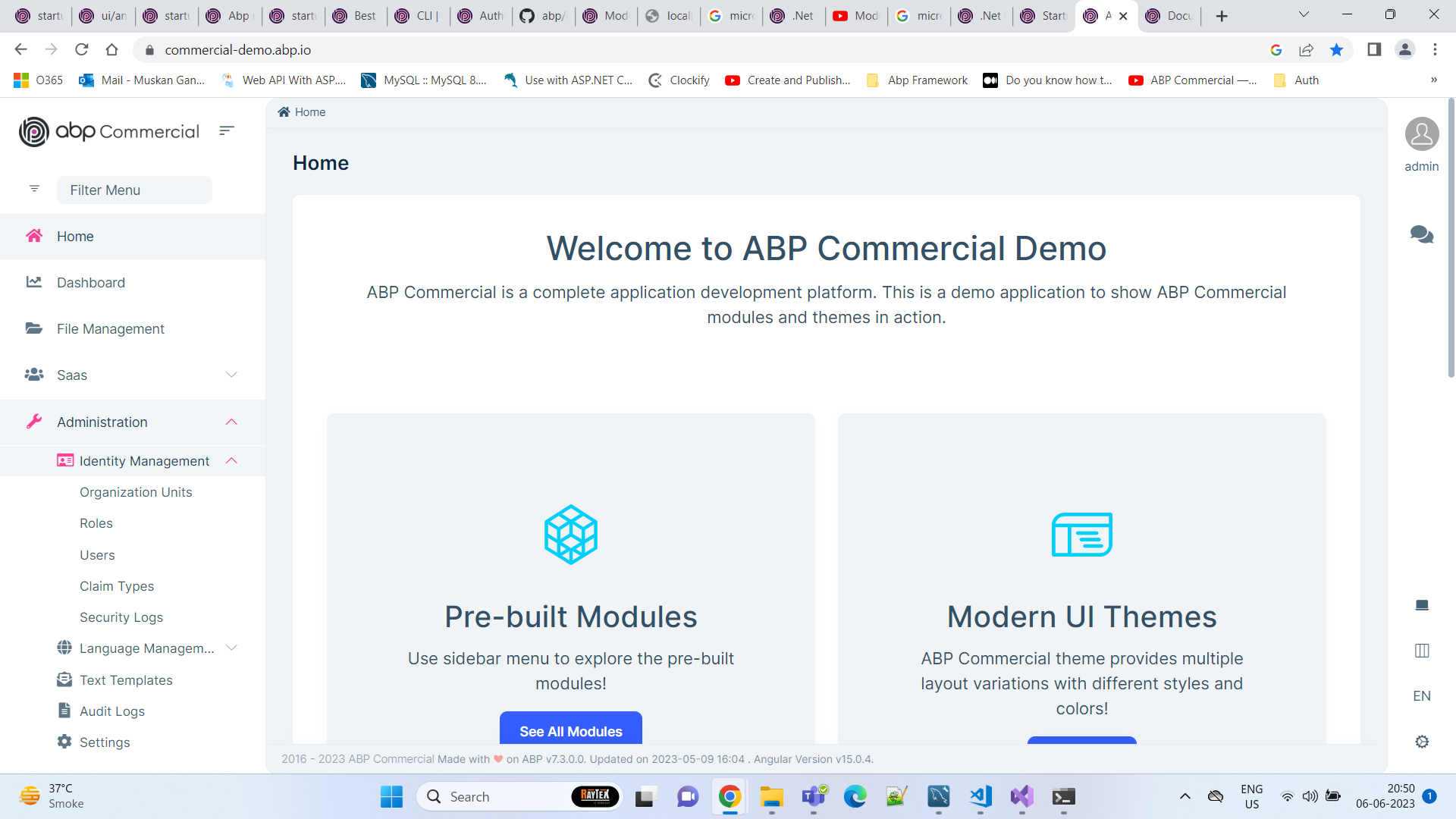ABP Framework version: v7.2.2
UI type: Angular
DB provider: EF Core
Tiered (MVC) or Identity Server Separated (Angular): yes Identity Server Separated (Angular)
Exception message and stack trace:
Steps to reproduce the issue:" Download the ABP commercial framework solution with microservices as template from abp suite. After setting up the environment locally login to app. After successful login we are getting the below screen:
instead of this we should get the page with admin menus as below:
33 Answer(s)
-
0
Hi,
It's a problem, we will fix it.
You can use the following temporary solution:
- Add
<PackageReference Include="Volo.Abp.Identity.Pro.Domain" Version="7.2.2" />toG1.health.AdministrationService.Domain.csproj - Add
typeof(AbpIdentityProDomainModule),toAdministrationServiceDomainModule
- Add
-
0
that worked, thanks.
-
0
Chat module migration is throwing exception. We have followed instructions as per here : https://docs.abp.io/en/commercial/latest/modules/chat installed location: identityService.
Chat module migration is giving below error:
Autofac.Core.DependencyResolutionException: 'An exception was thrown while activating Volo.Chat.EntityFrameworkCore.ChatDbContext -> λ:Microsoft.EntityFrameworkCore.DbContextOptions`1[[Volo.Chat.EntityFrameworkCore.ChatDbContext, Volo.Chat.EntityFrameworkCore, Version=7.2.2.0, Culture=neutral, PublicKeyToken=null]].'
AbpException: No configuration found for Microsoft.EntityFrameworkCore.DbContext, Microsoft.EntityFrameworkCore, Version=7.0.2.0, Culture=neutral, PublicKeyToken=adb9793829ddae60! Use services.Configure
This exception was originally thrown at this call stack:
Volo.Abp.EntityFrameworkCore.DependencyInjection.DbContextOptionsFactory.Configure<TDbContext>(Volo.Abp.EntityFrameworkCore.AbpDbContextOptions, Volo.Abp.EntityFrameworkCore.DependencyInjection.AbpDbContextConfigurationContext<TDbContext>) Volo.Abp.EntityFrameworkCore.DependencyInjection.DbContextOptionsFactory.Create<TDbContext>(System.IServiceProvider) Autofac.Extensions.DependencyInjection.AutofacRegistration.Register.AnonymousMethod__0(Autofac.IComponentContext, System.Collections.Generic.IEnumerable<Autofac.Core.Parameter>) Autofac.Core.Activators.Delegate.DelegateActivator.ActivateInstance(Autofac.IComponentContext, System.Collections.Generic.IEnumerable<Autofac.Core.Parameter>) in DelegateActivator.cs Autofac.Core.Activators.Delegate.DelegateActivator.ConfigurePipeline.AnonymousMethod__2_0(Autofac.Core.Resolving.Pipeline.ResolveRequestContext, System.Action<Autofac.Core.Resolving.Pipeline.ResolveRequestContext>) in DelegateActivator.cs Autofac.Core.Resolving.Middleware.DelegateMiddleware.Execute(Autofac.Core.Resolving.Pipeline.ResolveRequestContext, System.Action<Autofac.Core.Resolving.Pipeline.ResolveRequestContext>) in DelegateMiddleware.cs Autofac.Core.Resolving.Pipeline.ResolvePipelineBuilder.BuildPipeline.AnonymousMethod__1(Autofac.Core.Resolving.Pipeline.ResolveRequestContext) in ResolvePipelineBuilder.cs Autofac.Core.Resolving.Middleware.DisposalTrackingMiddleware.Execute(Autofac.Core.Resolving.Pipeline.ResolveRequestContext, System.Action<Autofac.Core.Resolving.Pipeline.ResolveRequestContext>) in DisposalTrackingMiddleware.cs Autofac.Core.Resolving.Pipeline.ResolvePipelineBuilder.BuildPipeline.AnonymousMethod__1(Autofac.Core.Resolving.Pipeline.ResolveRequestContext) in ResolvePipelineBuilder.cs Autofac.Core.Resolving.Middleware.ActivatorErrorHandlingMiddleware.Execute(Autofac.Core.Resolving.Pipeline.ResolveRequestContext, System.Action<Autofac.Core.Resolving.Pipeline.ResolveRequestContext>) in ActivatorErrorHandlingMiddleware.cs -
0
Hi,
Please create a new question; thanks.
BTW, you can check this: https://support.abp.io/QA/Questions/5211
-
0
Hi,
It's a problem, we will fix it.
You can use the following temporary solution:
- Add
<PackageReference Include="Volo.Abp.Identity.Pro.Domain" Version="7.2.2" />toG1.health.AdministrationService.Domain.csproj - Add
typeof(AbpIdentityProDomainModule),toAdministrationServiceDomainModule
This was working but it created another issue. When trying to open permission menu on actions button for any user, it was giving 500 internal server error. after removing the above package references permission was working fine.
- Add
-
0
I will check it.
-
0
I will check it.
Could you please provide an update on this? what is expected time for fixing this?
-
0
Hi,
I reproduced the problem.
You can try remove
typeof(AbpIdentityProDomainModule)fromAdministrationServiceDomainModuleAnd add
context.Services.AddTransient<AbpIdentityProSettingDefinitionProvider>();toAdministrationServiceDomainModule.


